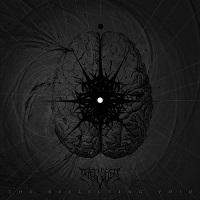Infestus – Darkness Triumphantly Enthroned
Tuesday, 9th September 2014
Give us a one-man guided black metal with character and gall over a faceless, flannel-shirt brigade any day of the week, ya know? This scribe always ponders (and has sometimes scribbled on this very site and elsewhere) of how Euronymous would react if he saw the image some so-called black metal bands have taken on. He’d probably do somersaults in his crypt if he could. But you get the idea: One of the main purposes of the early 90s Norwegian movement was to give black metal an identity both sonically and visually. Those who don’t abide by those rules/parameters would simply be considered null. By them. (DR has a bit more wiggle room, obviously.)
In the case of Germany’s Infestus, their lone driving force Andras is everything you could want in a black metal figurehead. He’s outspoken, opinionated, appropriately tormented, and above else, supremely talented, as evidenced by the band’s new The Reflecting Void. Heightened by a smooth, but not overly polished production job, the album’s penchant for sweeping melodies, chaotic riffing, and sharp, memorable songs give Infestus the latitude and respectability that many bands are still searching for. As it seems, the band is still finding their way, as evidenced by this very entertaining email interview with Mr. Andras himself…
Dead Rhetoric: You’ve been active since 2003, but have the distinction of being a German black metal band. Describe some of the roadblocks you’ve encountered over the last ten years.
Andras: There have been way too many “roadblocks.” Everything that happened brought me to the point I am right now. So you can see all these things as necessary, as production steps that polished the reflecting black jewel which my music is.
Dead Rhetoric: What drew you to black metal? I’m sure it would have been quite easy to fire up a power metal band instead…
Andras: It was and still is my differentness. I never wanted to belong to this society in which so many unnecessary existences reside. There has always been something very dark inside of me since the first day of my life I can remember, something that made me different from others. It took a long way until I finally accepted that fact. However, given these circumstances and the need to channel my aggression/darkness to prevent myself from destroying my life, black metal was the only suitable musical possibility for me back in that time.
Dead Rhetoric: Your early days, specifically Worshipping Times of Old: What do you remember most?
Andras: A quite aggressive and solitary person trying to express himself in a band. It was not possible for me. I held back many ideas because they were too personal. This album was just a first tiny step towards a solitary future that holds true to my devotion.
Dead Rhetoric: What was the working relationship like between you, Harbath and Dagon in those days?
Andras: I haven’t been an easy person to work with. Very demanding and angry. We rehearsed regularly, but I was rarely satisfied. I had a much more intense need to write music than Harbarth, which ultimately resulted in him leaving the band and me taking over the guitars. Dagon and I are still very good friends.
Dead Rhetoric: Doing the band by yourself…the ultimate form of creative satisfaction?
Andras: Indeed. Pure creative freedom. That’s what I need. But on the other hand, it is very much work, especially on this musical level. Many people seem not to believe that this music is made by just one person, even handling every instrument. I should take it as a compliment. You may have noticed that this music is far away from generic black metal. Nowadays I repeatedly catch myself thinking of joining with some musicians for Infestus. It might bring another level to the music, adding different influences. But on the other hand, it would destroy the pure coherent spirit of this soul-devouring art which is Infestus.
Dead Rhetoric: Are you difficult to work with?
Andras: I can get quite difficult if things are important to me. On the other hand, I can easily cut off myself because so many things don’t have a meaning to me. So yes and no.
Dead Rhetoric: In many ways Ex|Ist help put the band on the map. Reflecting on the album, are you pleased with how it turned out and was received?
Andras: Yes, I am. Besides having received constant great reviews for Ex|Ist, it was and is more importantly a very personal album for me. Of course there are always some minor things that I would have done different afterwards (predominantly technical things). But in the end I see this album as a timeless creation just as The Reflecting Void.
Dead Rhetoric: The Reflecting Void, though, is quite the step up. It’s your most fully-realized work yet. What was your approach when writing the songs?
Andras: Hard to say. It’s something that comes quite naturally. There are different kinds of situations in which I feel a certain impulse that I give in, if possible. It is like someone knocking on an inside door of your mind trying to get out or in, depending from which side you see it. Of course I start with guitar tracks, step-by-step assembling a song until it is complete. This might happen in a quite short period or take an enormous amount of time. When the guitar tracks of every song are composed, I concentrate on drums by playing along to guitar demo tracks. Somewhere in between lyrics are created. This is of course also dependent on which creative medium I want to use at which point of time. The “quite the step up”-sensation that you have is also some kind of natural thing. I don’t force things when it comes to creativity. Emotional expression in music needs its time and with the time you naturally evolve due to internal and external influences, changes in taste, etc.
Dead Rhetoric: Some of the melodies you use are dark and atmospheric. To you, what makes up a good melody line?
Andras: It has to tear apart my “soul.”
Dead Rhetoric: “Cortical Spreading Darkness” could be considered the album’s apex. For you, what does this song represent?
Andras: That’s a matter of taste. Anyway, “Cortical Spreading Darkness” represents a sudden change of emotional sensation, corrupting your inner and outer perception. A repeatedly occurring electrical wave of darkness that spreads all over your cortex, drowning your existence in negativity.
Dead Rhetoric: Finally, what’s on the agenda for the rest of 2014?
Andras: Trying not to lose myself in cortical spreading darkness.
























